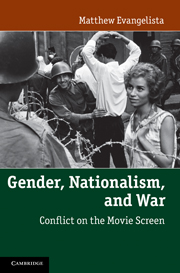Book contents
- Frontmatter
- Contents
- List of figures
- Preface
- 1 Virginia Woolf's purse
- 2 Algeria: a world constructed out of ruins
- 3 Yugoslavia: archetype or anomaly?
- 4 Chechnya: virgins, mothers, and terrorists
- 5 Québec: oui, no, or femme
- 6 “To live to see better times”: gender, nationalism, sovereignty, equality
- Index
- References
1 - Virginia Woolf's purse
Published online by Cambridge University Press: 05 June 2012
- Frontmatter
- Contents
- List of figures
- Preface
- 1 Virginia Woolf's purse
- 2 Algeria: a world constructed out of ruins
- 3 Yugoslavia: archetype or anomaly?
- 4 Chechnya: virgins, mothers, and terrorists
- 5 Québec: oui, no, or femme
- 6 “To live to see better times”: gender, nationalism, sovereignty, equality
- Index
- References
Summary
“We all came out of Gogol's ‘Overcoat,’ ” the most famous apocryphal saying of Russian literature, is attributed to Dostoevsky. It suggests not only that Gogol was the great source of the Russian novel but that his works lent themselves to a wide enough range of interpretations for his overcoat to shelter, comfortably, future Turgenevs, Chekhovs, Dostoevskys, and Tolstoys.
Alex de Jonge, 1974Motherland. Mother tongue. The birth of the nation. These common metaphors suggest a link between gender and nationalist movements. Women in general and mothers in particular are responsible for inculcating the key characteristics that define a cultural or ethnic identity, including such basics as language, religion, dress, and cuisine. Women serve as “boundary markers” between different national, ethnic, and religious communities, and thus might be expected to play an important role when such communities come into violent conflict. Yet the relationship between gender, identity, and ethnic or nationalist conflict is only beginning to receive systematic investigation from social scientists. In some major overviews of ethnic conflict, by anthropologists and political scientists alike, one cannot even find gender or women in the index. A number of scholars have begun to remedy the situation by addressing the role of women and political violence broadly – a subject made more urgent in the wake of the “war on terror,” the Abu Ghraib torture scandal, and incidences of female suicide terrorism.
- Type
- Chapter
- Information
- Gender, Nationalism, and WarConflict on the Movie Screen, pp. 1 - 24Publisher: Cambridge University PressPrint publication year: 2011

